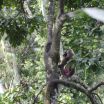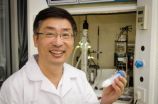Discovery of first motor with revolution motion in a virus-killing bacteria advances nanotechnology
2013-03-20
(Press-News.org) Scientists have cracked a 35-year-old mystery about the workings of the natural motors that are serving as models for development of a futuristic genre of synthetic nanomotors that pump therapeutic DNA, RNA or drugs into individual diseased cells. Their report revealing the innermost mechanisms of these nanomotors in a bacteria-killing virus — and a new way to move DNA through cells — is being published online today in the journal ACS Nano.
Peixuan Guo and colleagues explain that two motors have been found in nature: A linear motor and a rotating motor. Now they report discovery of a third type, a revolving molecular motor. Guo pointed out that nanomotors will open the door to practical machines and other nanotechnology devices so small that 100,000 would fit across the width of a human hair. One major natural prototype for those development efforts has been the motor that packages DNA into the shell of bacteriophage phi29, a virus that infects and kills bacteria. Guo's own research team wants to embed a synthetic version of that motor into nanomedical devices that are injected into the body, travel to diseased cells and pump in medication. A major barrier in doing so has been uncertainty and controversy about exactly how the phi29 motor moves. Scientists thought that it worked by rotating or spinning in the same motion as the Earth turning on its axis.
In their ACS Nano paper, Guo, with his team Zhengyi Zhao, Emil Khisamutdinov and Chad Schwartz, challenges that idea. Indeed, they discovered that the phi29 motor moves DNA without any rotational motion. The motor moves DNA with a revolving in the same motion as the Earth revolving around the sun. "The revolution without rotation model could resolve a big conundrum troubling the past 35 years of painstaking investigation of the mechanism of these viral DNA packaging motors," the report states.
###
The authors acknowledge funding from the National Institute of Biomedical Imaging and Bioengineering, National Institutes of Health.
Illustrated videos of the mechanism can be found at http://nanobio.uky.edu/movie2013.html.
Journalists can obtain a copy of the paper from newsroom@acs.org.
The American Chemical Society is a nonprofit organization chartered by the U.S. Congress. With more than 163,000 members, ACS is the world's largest scientific society and a global leader in providing access to chemistry-related research through its multiple databases, peer-reviewed journals and scientific conferences. Its main offices are in Washington, D.C., and Columbus, Ohio.
To automatically receive news releases from the American Chemical Society, contact newsroom@acs.org.
Follow us: Twitter Facebook END
ELSE PRESS RELEASES FROM THIS DATE:
2013-03-20
An innovative new process that releases the energy in coal without burning — while capturing carbon dioxide, the major greenhouse gas — has passed a milestone on the route to possible commercial use, scientists are reporting. Their study in the ACS journal Energy & Fuels describes results of a successful 200-hour test on a sub-pilot scale version of the technology using two inexpensive but highly polluting forms of coal.
Liang-Shih Fan and colleagues explain that carbon capture and sequestration ranks high among the approaches for reducing coal-related emissions of the ...
2013-03-20
The mystery of exactly how consumption of extra virgin olive oil helps reduce the risk of Alzheimer's disease (AD) may lie in one component of olive oil that helps shuttle the abnormal AD proteins out of the brain, scientists are reporting in a new study. It appears in the journal ACS Chemical Neuroscience.
Amal Kaddoumi and colleagues note that AD affects about 30 million people worldwide, but the prevalence is lower in Mediterranean countries. Scientists once attributed it to the high concentration of healthful monounsaturated fats in olive oil — consumed in large amounts ...
2013-03-20
An international team of scientists led by Dr Kate Sanders from the University of Adelaide, and including Dr Mike Lee from the South Australian Museum, has uncovered how some sea snakes have developed 'shrunken heads' – or smaller physical features than their related species.
Their research is published today in the journal Molecular Ecology (doi: 10.1111/mec.12291).
A large head – "all the better to eat you with" - would seem to be indispensable to sea snakes, which typically have to swallow large spiny fish. However, there are some circumstances where it wouldn't ...
2013-03-20
Hunting for meat in the African rainforests has halved the number of primates. However, the hunting also has other negative consequences. The decline in the number of primates causes a reduction in the dispersal of seed by the primates, and this leads to a reduction in the numbers of important fruit trees and changes to the rainforest. This has been shown in new research from Lund University in Sweden.
The destruction of the world's rainforests is generally recognised as a major problem. However, it is not only felling and clear-cutting that change the rainforest. A research ...
2013-03-20
A new wonder material that can generate hydrogen, produce clean water and even create energy.
Science fiction? Hardly, and there's more - It can also desalinate water, be used as flexible water filtration membranes, help recover energy from desalination waste brine, be made into flexible solar cells and can also double the lifespan of lithium ion batteries. With its superior bacteria-killing capabilities, it can also be used to develop a new type of antibacterial bandage.
Scientists at Nanyang Technological University (NTU) in Singapore, led by Associate Professor Darren ...
2013-03-20
EUGENE, Ore. -- (March 20, 2013) -- University of Oregon chemists say that ultra-thin films of nickel and iron oxides made through a solution synthesis process are promising catalysts to combine with semiconductors to make devices that capture sunlight and convert water into hydrogen and oxygen gases.
Researchers in the Solar Materials and Electrochemistry Laboratory of Shannon Boettcher, professor of chemistry, studied the catalyst material and also developed a computer model for applying catalyst thin films in solar water-splitting devices as a tool to predict the effectiveness ...
2013-03-20
Soybean meal is a bi-product following oil extraction from soybean seeds. It is rich in protein, which usually makes up around 40% of the nutritional components of the seeds and dependent on the line, and can also contain high oleic acid (a monounsaturated omega-9 fatty acid).
The study looked at the role soybeans could have in the prevention of cancer. Using a variety of soybean lines which were high in oleic acid and protein, the researchers looked to monitor bioactivity between the peptides derived from the meals of soybean and various types of human cancer cells. ...
2013-03-20
PROBLEMS in accessing donor sperm and eggs at home appear to be behind a reported increase in the number of UK citizens who seek fertility treatment abroad, despite the fact that this is widely seen as risky. Now, a team of academic experts, including a University of Huddersfield professor, have investigated the phenomenon and analysed the attitudes of health professionals.
The researchers found little support for legal controls on cross-border fertility treatment, but UK-based clinicians stressed the importance of checking out overseas fertility clinics in order to ...
2013-03-20
COLUMBUS, Ohio -- Low-income parents who receive federal child care subsidies are more satisfied with their child care than those who don't receive such help, according to a recent study.
A survey of parents in Missouri found that nearly nine in 10 subsidy recipients reported the funds were a tremendous boost to their family's ability to work and make a living.
In addition, those who received subsidies were less likely to have problems with work flexibility, indicating that they had an easier time balancing work and family.
The results show the importance of child ...
2013-03-20
ANN ARBOR—A common test used to determine mercury exposure from dental amalgam fillings may significantly overestimate the amount of the toxic metal released from fillings, according to University of Michigan researchers.
Scientists agree that dental amalgam fillings slowly release mercury vapor into the mouth. But both the amount of mercury released and the question of whether this exposure presents a significant health risk remain controversial.
Public health studies often make the assumption that mercury in urine (which is composed mostly of inorganic mercury) can ...
LAST 30 PRESS RELEASES:
[Press-News.org] Discovery of first motor with revolution motion in a virus-killing bacteria advances nanotechnology


